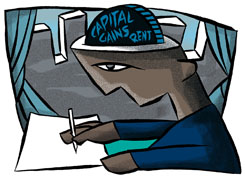
Our big residential complex Mathurdas Colony in Kalina Mumbai was embroiled in legal disputes for decades as the landlord had died intestate and his relatives were all fighting for a piece of the pie. We tenants were all paying rent to the court receiver. After the court order, we paid rent to the deceased landlord's relatives as per court order, who eventually sold to Hindva Builders. Hindva / Jaavi Infra notified us to vacate in September 2017, and we complied on 15-Sep-17. Mummy and I moved to Goa. We have a court registered agreement that included compensation for rent, moving, and a month's rent as brokerage, all of which we received for year 1, 16-Sep-17 to 15-Sep-18. After persistent reminders we got the rent compensation for year 2. Since then, nothing. Some tenants paid the tenants association reportedly 40,000 for a court case. We learned they all got rent after winning the case. I was abroad, mummy was aged and alone in Goa, I was in touch with Hindva, and was advised to not join the case, with repeated verbal assurances that we would get the rent. I have since begged, pleaded, to no avail. Mostly Hindva ignores my phone calls, SMS, email, prmises to revert and fails to, evert time for five years. When he replied, it was only to sweet-talk us into gullibly believing that we would get the rent. We lost hope of seeing the new permanent alternate accommodation in our lifetime as no construction has began until now, other than demolition of all buildings and some chawls. We were even considering selling. When we last spoke to Hindva, he denied that anyone was given rent. He said rent would begin as of 1-Jul-24 and we would receive by 10-Jul-24, but till now nothing. Hindva has since acquired a financial partner MS Realty. Our blood relative in Bombay went to meet Hindva, but it was actually the office of MS Realty. They advised her to meet Hindva, which she managed to do only after MS Realty apparently asked Hindva why our rent payment was still outstanding. Hindva seems determined to not pay us the rent, despite MS Realty wanting them to. On asking about sale, we learned that 40 tenants had already sold. Would truly appreciate your valued advice as to what to do to get our rent arrears from 16-Sep-19, and how to ensure fair compensation for our 641 area of we decide to sell. Mum is now 91 and I am 67.
Ans: Your situation is quite complex and involves multiple legal and personal factors. Here are the key issues you are facing:
Non-receipt of rent compensation from Hindva Builders since September 2019.
Hindva's reluctance to pay rent arrears despite assurances.
Possibility of selling your entitlement for fair compensation.
The involvement of MS Realty as a financial partner.
Steps to Address Non-Receipt of Rent
Document All Communications
Keep a detailed record of all communications with Hindva and MS Realty.
Note dates, times, and content of calls, emails, and meetings.
Legal Consultation
Consult a Certified Financial Planner (CFP) or a legal expert specializing in real estate and tenancy issues.
They can provide tailored advice and help draft legal notices.
Issue a Legal Notice
Send a formal legal notice to Hindva Builders and MS Realty.
Clearly state the non-payment of rent arrears from 16-Sep-19.
Mention the repeated verbal assurances and the financial and emotional distress caused.
Engage with a Tenants’ Association
Join or collaborate with the tenants’ association if possible.
Collective action can strengthen your position.
Pursuing Fair Compensation for Sale
Property Valuation
Obtain an independent valuation of your 641 area from a certified property valuer.
Ensure the valuation reflects current market conditions in Kalina, Mumbai.
Legal Advice on Sale Agreement
Seek legal advice to review any sale agreement proposed by Hindva or MS Realty.
Ensure the agreement includes fair compensation and clear terms for payment.
Negotiation
Use the independent valuation to negotiate with Hindva and MS Realty.
Aim for a transparent and fair settlement.
Additional Steps for Assurance
Verify Other Tenants’ Experiences
Confirm with other tenants who have sold or received compensation.
Understand the process they followed and the terms they agreed to.
Advocate Support
Consider engaging a local tenants’ rights advocate or NGO.
They can offer support and additional resources.
Final Insights
Your patience and perseverance in dealing with this situation are commendable. Given the complexity, professional legal and financial advice is essential. Act promptly to safeguard your rights and ensure fair compensation.
Best Regards,
K. Ramalingam, MBA, CFP
Chief Financial Planner,
www.holisticinvestment.in

























